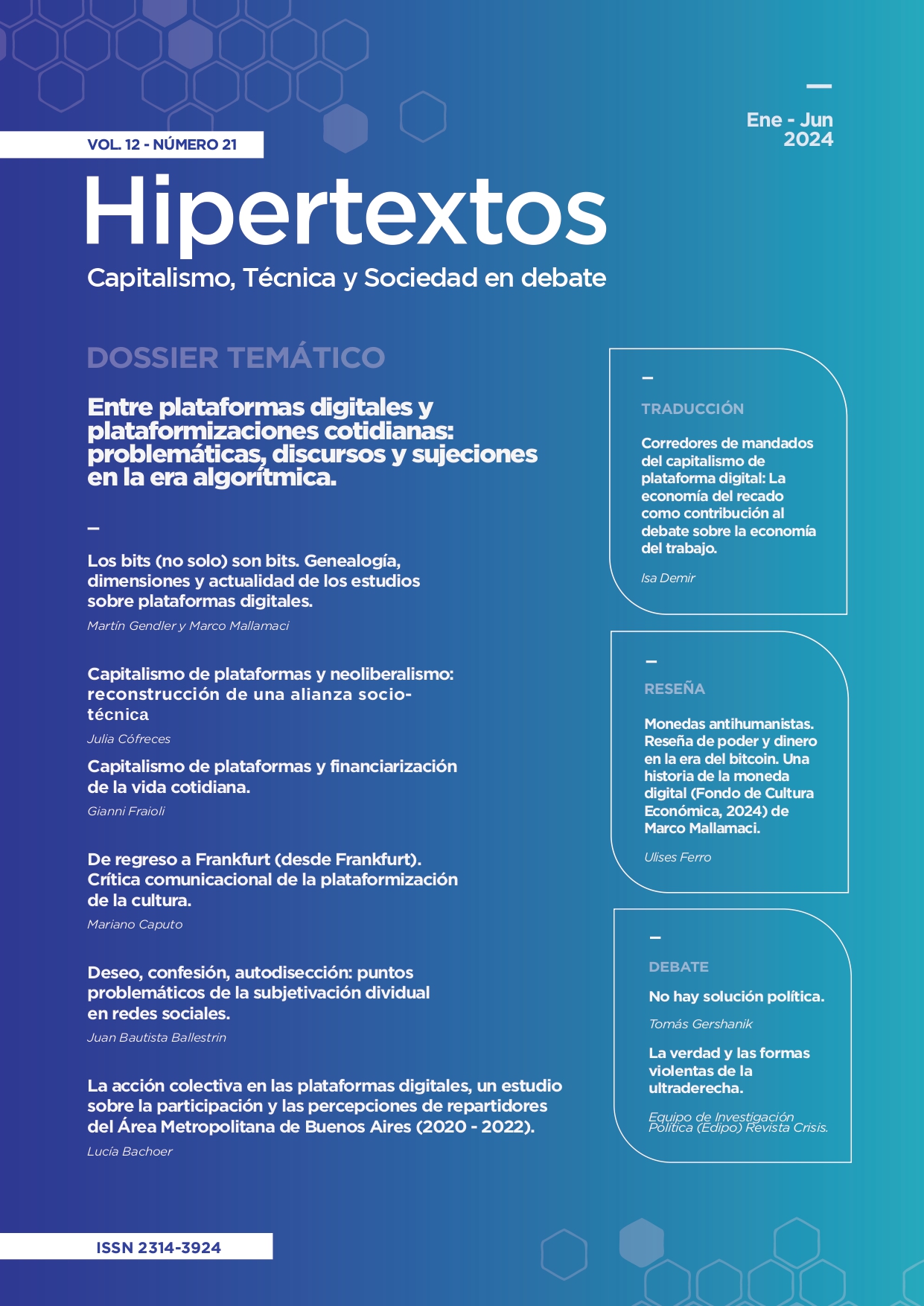Corredores de mandados del capitalismo de plataforma digital
La economía del recado como contribución al debate sobre la economía del trabajo
DOI:
https://doi.org/10.24215/23143924e078Palabras clave:
“economía de changas”, economía de plataforma, capitalismo de plataforma, trabajador de changas, trabajador de plataformaResumen
Este artículo describe un nuevo concepto denominado economía de los mandados. Examina el lado oscuro de la economía de plataforma y la “economía de changas” y hace una valiosa contribución a este campo. Estos conceptos, especialmente para los estudiosos liberales, ocultan el impacto negativo del capitalismo de plataforma en las relaciones de producción y en la clase trabajadora haciendo hincapié en las tecnologías digitales y el trabajo a destajo. La economía del mandado, sin embargo, pone especialmente de relieve la degradación del trabajo, independientemente de su cualificación, junto con procesos como la flexibilización, la precarización y la informalización. Esto se debe a que, en las condiciones de la economía del mandado, las plataformas tratan todos los tipos de trabajo como mandados baratos, sin valor y degradados. La principal misión de la economía de plataforma es acabar con el empleo utilizando el discurso de la flexibilidad y el emprendimiento y transformar a todos los asalariados en trabajadores de mandados clasificándolos como autónomos. Por este motivo, el artículo propone utilizar el concepto de economía del mandado junto con el de economía de plataforma, que se refiere a las infraestructuras digitales, y el de “economía de changas”, que hace hincapié en el trabajo a destajo.
Referencias
Yılında En Az 30 Moto Kurye, İş Cinayetlerinde Yaşamini Yitirdi. (2 de enero de 2022). Cumhuriyet. https://www.cumhuriyet.com.tr/turkiye/2021-yilinda-en-az-30-moto-kurye-is-cinayetlerinde-yasamini-yitirdi-1897196
Yılında En Az 58 Moto Kurye Iş Cinayetlerinde Hayatını Kaybetti. (11 de enero de 2023). Bieanet. https://m.bianet.org/bianet/insan-haklari/272694-2022-yilinda-en-az-58-moto-kurye-is-cinayetlerinde-hayatini-kaybetti
Alyanak, O. y Karlıdağ, Z. (23 de octubre de 2023). All Couriers of the World, unite! 1+1 Express. https://birartibir.org/dunyanin-butun-kuryeleri-birlesin/
Berg, J.M. (2016). Income Security in the On-demand Economy: Findings and Policy Les sons from a Survey of Crowdworkers. ILO.
Berg, J., Furrer, M, Harmon, E., Rani, U. y Silverman, M. S. (2018). Digital Labour Platforms and The Future Of Work: Towards Decent Work In The Online World. International Labour Office.
Bergvall-Kåreborn, B. y Howcroft, D. (2014). Amazon Mechanical Turk and the Com modification of Labour. New Technology, Work and Employment, 29(3), 213-223. https://doi.org/10.1111/ntwe.12038
BBC News Africa. (3 de noviembre de 2019). Silicon Valley’s Online Slave Market. [Archivo de video]. YouTube. https://www.youtube.com/watch?v=2IdII_n28e0&t=10s
Bent, P. H. (2017). Historical Perspectives on Precarious Work: The Cases of Egypt and India Under British Imperialism. Global Labour Journal, 8(1), 3-16. https://doi.org/10.15173/glj.v8i1.2716
Braverman, H. (1998). Labor and Monopoly Capital: The Degradation of Work in the Twen tieth Century. Monthly Review Press.
Campbell, I. (2022). Platform Work and Precariousness: Low Earnings and Limited Control of Work. En V. De Stefano, I. Durri, Ch. Stylogiannis y M. Wouters (Eds.), A Research Agenda for the Gig Economy and Society (pp. 113-132). Edward Elgar Publishing.
Cann, V. (17 de julio de 2022). Politicians Should Stop the ‘Uberisation’ of EU Politics. Social Europe. https://www.socialeurope.eu/politicians-should-stop-the-uberisation-of-eu-politics
Cambridge Dictionary (s. f.). Grunt Work. En English Dictionary. Recuperado el 6 de abril de 2023 de https://dictionary.cambridge.org/dictionary/english/grunt-work
Ceki, M. (8 de julio de 2022). Kaza Süsü Verilmiş Cinayetler: Moto Kurye Ölümleri. Evrensel https://www.evrensel.net/haber/469668/kaza-susu-verilmis-cinayetler-moto-kuryeolumleri
Ceylan, B. (2022). Labor Process and Work in Platform Capitalism: A Study on Motor Couriers of Digital Platforms in İstanbul. [Tesis de maestría, Middle East Technical University]. https://hdl.handle.net/11511/99534
Cheng, J., Teevan J., Iqbal S. T. y Bernstien M. S. (18 de abril de 2015). Break It Down: A Comparison of Macro- and Microtasks [Conferencia]. Proceedings of the 33rd Annual ACM Conference on Human Factors in Computing Systems CHI. Seoul, República de Corea. https://doi.org/10.1145/2702123.2702146
Christiaens, T. (2023). Digital Working Lives: Worker Autonomy and the Gig Economy. Rowman & Littlefield.
De Stefano, V. (2016). The Rise of the ‘Just-In-Time Workforce’: On-Demand Work, Crowdwork, and Labor Protection in the Gig Economy. International Labour Office.
Dictionary.com. (2023). Grunt work. Recuperado en 16 de abril de 2023 de https://www.diction ary.com/browse/grunt-work
Duggan, J., McDonnell A, Sherman U. y Carbery R. (2022). Work in the Gig Economy. A Research Overview. Routledge.
Dukes, R. (2020). Regulating Gig. Modern Law Review, 83(1), 217-228. https://doi.org/10.1111/1468-2230.12485
Dukes, R. (2022). On Demand Work as a Legal Framework to Understand the Gig Economy. En V. De Stefano, I. Durri, H. Stylogiannis y M. Wouters (Eds.), A research agenda for the “gig economy” and society (pp. 113-148). Edward Elgar Publishing.
Fairwork. (2022). Domestic Platform Work in the Middle East and North Africa. Fairwork Foundation.
Fairwork. (2023). Fairwork Nigeria Ratings 2023: Advocating for Increased Safety and Security in the Platform Economy. Fairwork Foundation.
Fairwork. (2023). Fairwork BiH Ratings 2023: Labour Standards in the Platform Economy. Fairwork Foundation.
Fairwork. (2023). Fairwork United States Ratings 2023: A Crisis of Safety and Fair Work in a Racialised Platform Economy. Fairwork Foundation.
Farinella, D. y Davide A. (2023). Beyond Formality: The Informalisation and Tertiarisation of Labour. En I. Ness (Eds.), The Routledge Handbook of the “Gig Economys” (pp. 116-130). Routledge.
Friedman, G. (2014). Workers without Employers: Shadow Corporations and the Rise of the “gig economy”. Review of Keynesian Economics, 2(2), 171-188.
Gandini, A. (2016). Digital Work: Self-branding and Social Capital in the Freelance Knowledge Economy. Marketing Theory, 16(1), 123-141. https://doi.org/10.1177/1470593115607942
Getir Dünyaya Açılacak. (30 de enero de 2018). Capital. https://www.capital.com.tr/yazarlar/selcuk-ergenc/getir-dunyaya-acilacak
Glynos, J. (2008). Ideological Fantasies at Work. Journal of Political Ideologies, 13(3), 275- 296. https://doi.org/10.1080/13569310802376961
Graham, M. y Woodcock, J. (2018). Towards a Fairer Platform Economy: Introducing the Fairwork Foundation. Alternate Routes, (29), 242-53.
Gregory, K (2021). My Life Is More Valuable Than This’: Understanding Risk among On Demand Food Couriers in Edinburgh. Work, Employment and Society, 35(2), 316-331.
Harald, H., Lenaerts K. y Wayaert, W. (2020). The Platform Economy and Precarious Work. EMPL committee.
Heeks, R. (2017). Decent Work and the Digital Gig Economy: A Developing Country Perspective on Employment Impacts and Standards in Online Outsourcing, Crowdwork, etc. Development Informatics Working Paper 7, 1-79. http://dx.doi.org/10.2139/ssrn.3431033
Horowitz, S. (22 de Enero 2023). The Freelance Surge is the Industrial Revolution of Our Time. The At lantic. http://www.theatlantic.com/business/archive/2011/09/the-freelancesurge-is-the-industrial-revolution-of-our-time/244229/
Howe, J. (1 de junio de 2006). The Rise of Crowdsourcing. Wired. https://www.wired.com/2006/06/crowds
Huws, U., Spencer, N. y Coates M. (2019). The Platformisation of Work in Europe: Highlights from Research in 13 European Countries. Foundation for European Progressive Studies.
Huws, U., Spencer, N. y Syrdal, D.S. (2018). Online, On Call: The Spread of Digitally Organised Just-in-time Working and Its Implications for Standard Employment Models. New Technology, Work and Employment, 33(2), 113-129. https://doi.org/10.1111/ntwe.12111
Huws, U. y Joyce, S. (2016). Crowd Working Survey. University of Hertfordshire.
International Labour Organization. (2016). Non-standard Employment Around the World: Understanding Challenges, Shaping Prospects. Major publications
International Labour Organization. (2018). Digital Labour Platforms and the Future of Work: Towards Decent Work in the Online World. Major publications.
International Labour Organization. (2021). The Role of Digital Labour Platforms in Trans forming the World of Work. International Labour Office.
International Labour Organization. (2021). World Employment and Social Outlook: The Role of digital labour platforms in transforming the world of work. International Labour Office.
International Labour Organization. (2022). Motosikletli Kuryeler Odağında Teslimat Sektörü Çalışanlarında Psikososyal Risk Analizi “Iki Tekerlek Bir Kask”. International Labour Office.
İlyas, Ö. (2022). Freelance Emek. İletişim Yayınları.
Jäger, G., Zilian, L., Hofer, C. y Füllsack, M. (2019). Crowdworking: Working with or Against the Crowd? Journal of Economic Interaction and Coordination, 14, 761-788. https://doi.org/10.1007/s11403-019-00266-1
Kaine, S. y Josserand, E. (2019). The Organisation and Experience of Work in The Gig Economy. Journal of Industrial Relations, 61(4), 1-23. https://doi.org/10.1177/0022185619865480
Kalleberg, A. (2009). Precarious Work, Insecure Workers: Employment Relations in Tran sition. American Sociological Review, 74 (1), 1-22. https://doi.org/10.1177/000312240907400101
Kassem, S. (2023). Work and Alienation in the Platform Economy Amazon and the Power of Organization. Bristol University Press.
Kezar, A., De Paola, T. y Scott, D. (2019). The De changas Academy Mapping Labor in the Neoliberal University. John Hopkins University Press.
Kittur, A., Nickerson, J. Bernstein, M., Gerber, E., Shaw, A., Zimmerman, J., Lease, M. y Horton, J. (18 de diciembre de 2012). The Future of Crowd Work [Conferencia]. 16th ACM Conference on Computer Supported Coooperative Work (CSCW 2013). Association for Computing Machinery. San Antonio, EEUU. http://dx.doi.org/10.1145/2441776.2441923
Kuhn K. M. y Maleki, A. (2017). Micro-entrepreneurs, Dependent Contractors, and Instaserfs: Understanding Online Labour Platform Workforces. Academy of Management Perspectives, 31 (3), 183-200. https://doi.org/10.5465/amp.2015.0111
Lehdonvirta, V. (2018). Flexibility in the “gig economy”: Managing Time on Three Online Piece work Platforms. New Technology, Work and Employment, 33 (1), 13-29. https://doi.org/10.1111/ntwe.12102
Leighton, P. (2016). Professional Self-Employment, New Power and the Sharing Economy: Some Cautionary Tales from Uber. Journal of Management & Organization, 22 (6), 859- 874.
McGregor, S., Huet, E. y Davalos, J. (2020). Gig Economy Yes or No? App Companies Want Californians to Enshrine Their Drivers’ Contractor Status. Bloomberg Businessweek, November (2), 18-21.
Merriam-Webster. (s.f.) Errand Boy. Recuperado el 20 de Agosto de 2024 de https://www.merriam-webster.com/dictionary/errand%20boy
Narocki, C. (2021). Heatwaves as an Occupational Hazard: The Impact Of Heat and Heat waves on Workers’ Health, Safety and Wellbeing and on Social Inequalities. ETUI.
Ness, I. (2023). The Routledge Handbook of the Gig Economy. Routledge.
Oppong, T. (2019). Working in the “economía de changas” How to Thrive and Succeed When You Choose to Work for Yourself. KoganPage.
Oxford Advanced Learner’s Dictionary. (2001). Errand-legwork-gruntwork. Oxford University Press.
Özdemir, Ö. (9 de febrero 2021). Getir: Londra’ya Açılan Şirketin Kurucusu Nazım Salur, Geliştirdiği Teknoloji Modeli ve Eleştiriler için Ne Diyor?. BBC News Turkce https://www.bbc.com/turkce/haberler-turkiye-55991961
Özsoy, A. M. (10 de febrero de 2022). Yemeksepeti Workers in Action: Give Us Our Rights. Gazete Duvar. https://www.gazeteduvar.com.tr/yemeksepeti-iscileri-eylemde-haklarimizi-verinhaber-1552640
Öztürk, N. (16 de septiembre de 2021). Getir Dünyaya Açılıyor! Artık İspanya’da. Diyobi. https://diyobi.com/getir-dunyaya-aciliyor-artik-ispanyada/
Parker, G., Van Alstyne, M. y Choudary, S. (2016). Platform Revolution: How Networked Markets are Transforming the Economy and How to Make Them Work for You. Norton & Company.
Pulignano, V. (2019). Work and Employment under the Gig Economy. The Open Journal of Sociopolitical Studies, 12(3), 629-639. http://dx.doi.org/10.1285/i20356609v12i3p629
Rani, U. y Furrer, M. (2019). On-demand Digital Economy: Can Experience Ensure Work and Income Security for Microtask Workers? Jahrbücher Für Nationalökonomie Und Statistik, 239(3), 565-597. https://doi.org/10.1515/jbnst-2018-0019
Rani, U. y Furrer, M. (2021). Digital Labour Platforms and New Forms of Flexible Work in Developing Countries: Algorithmic Management of Work and Workers. Competition and Change, 25(1), 212-236. http://dx.doi.org/10.1177/1024529420905187
Rani, U. y Gobel, N. (2023). Job Instability, Precarity, Informality, and Inequality Labour in The Gig Economy. En I. Ness (Ed.), The Routledge Handbook of the Gig Economy (pp. 15-32). Routledge.
Ravenelle, A. (2017). Sharing Economy Workers: Selling, Not Sharing. Cambridge Journal of Regions, Economy and Society, 10(2), 281-295. https://doi.org/10.1093/cjres/rsw043
Rauscher, N. (2021). The Discourse on the Future of Work in The United States Under the Influence of Automation and the Platform Economy. Springer.
Ropponen, A., Hakanen, J. Hasu, M. y Seppänen, L. (2019). Workers’ Health, Wellbeing, and Safety in The Digitalizing Platform Economy. En S. Poutanen, A. Kovalainen y P. Rouvinen (Eds.), Digital Work and the Plat form Economy Understanding Tasks, Skills and Capabilities in The New Era (pp. 56-74). Routledge.
Rosenblat, A. (2018). Uberland: How Algorithms are Rewriting the Rules of Work. University of California Press.
Rosenblat, A. y Stark, L. (2016). Algorithmic Labor and Information Asymmetries: A Case Study of Uber’s Drivers. International Journal of Communication, 10, 3758-3784.
Scholz, T. (2017). Uberworked and Underpaid: How Workers are Disrupting the Digital Economy? Polity Press.
Schor, J. (2021). After the De Gig. How the Sharing Economy Got Hijacked and How To Win It Back. University of California Press.
Sedacca, N. (2022). Domestic Work and the “gig economy”. En V. De Stefano, I. Durri, C. Stylogiannis y M. Wouters (Eds.), A Research Agenda for the “gig economy” and Society (pp. 149-166). Edward Elgar Publishing.
Slee, T. (2015). What’s Yours is Mine: Against the Sharing Economy. OR Books.
Srnicek, N. (2017). Platform Capitalism. Polity Press.
Stanev, S. (2020). Uber, Employment and the gig economy. Social Europe. https://www.socialeurope.eu/uber-employment-and-the-gig-economy
Stanford, J. (2017). The Resurgence of Gig Work: Historical and Theoretical Perspectives. Economic and Labour Relations Review, 28 (3), 382-401. https://doi.org/10.1177/1035304617724303
Stewart, A. y Stanford, J. (2017). Regulating Work in the Gig Economy. What are The Options? The Economic and Labour Relations Review, 28, 420-437. https://doi.org/10.1177/1035304617722461
Surie, A. y Huws, U. (2023). Platformization and Informality: Pathways of Change, Alteration, and Transformation. En A. Surie y U. Huws (Ed.), Platformization and Informality: Pathways of Change, Alteration, and Transformation (pp. 1-12). Palgrave Macmillan.
Sutherland, W., Hossein Jarrahi, M. y Nelson, S. B. (2020). Work Precarity and Gig Literacies in Online Freelancing. Work, Employment and Society, 34 (3), 457-475. https://doi.org/10.1177/0950017019886511
Tassinari, A. y and Maccarone, V. (2020). Riders on the Storm: Workplace Solidarity among gig economy. Couriers in Italy and the UK. Work, Employment and Society, 34 (1), 35-54.
Taylor, M., Marsh, G., Nicol, D. y Broadbent, P. (2017). Good Work: The Taylor Review of Modern Working Practices. Departamento de Empresa y Comercio del Gobierno Británico.
Toh, J. (2021). Another Win for Workers: Uber Drivers are Employees. Social Europe. https://www.socialeurope.eu/another-win-for-workers-uber-drivers-are-employees
Türk Dil Kurumu Sözlükleri. (2022). Ayak İşi. https://sozluk.gov.tr/
Urzì Brancati, M.C., Pesole, A. y Fernández-Macías, E. (2020). New Evidence on Platform Workers in Europe. Results from the Second COLLEEM Survey. Publications Office of the European Union.
Valenduc, G. y Vendramin, P. (2016). Work in the Digital Economy: Sorting the Old from the New. ETUI.
Vallas, S. (2019). Platform Capitalism: What’s at Stake for Workers? New Labor Forum, 28 (1), 48-59. https://doi.org/10.1177/1095796018817059
Vallas, S. y Schor, J. (2020). What Do Platforms Do? Understanding the Gig Economy. Annual Reviews, 15 (7), 273-294.
Van Doorn, N. (2017). Platform Labor: On the Gendered and Racialized Exploitation of Low income Service Work in the ‘On-demand’ Economy. Information, Communication & Society, 6 (20), 898-914. https://doi.org/10.1080/1369118X.2017.1294194
Vargas, D., Maldonado Castañeda, O. y Rocío Hernández, M. (2022). Technolegal Expulsions: Platform Food Delivery Workers and Work Regulations in Colombia. Journal of Labor and Society, 25 (1), 1-27.
Wood, A., Lehdonvirta, V. y Graham, M. (2018). Workers of the Internet Unite? Online Freelancer Organisation among Remote Gig Economy. Workers in Six Asian and African Countries. New Technology, Work and Employment, 33 (2), 95-112. https://doi.org/10.1111/ntwe.12112
Wood, A., Graham, M., Lehdonvirta, V. y Hjorth, I. (2019). Networked but Commodified: The (Dis)Embeddedness of Digital Labour in the Gig Economy. Sociology, 53(5), 931- 950. https://doi.org/10.1177/0038038519828906
Wood, A., Graham, M., Lehdonvirta, V. y Hjorth, I. (2019). Good De changas, Bad De changas: Autonomy and Algorithmic Control in the Global Gig Economy. Work, Employment and Society, 33(1), 56-75. https://doi.org/10.1177/0950017018785616
Woodcock, J. y Mark G. (2020). The Gig Economy: A Critical Introduction. Polity Press.
Zanoni, P. y Frederick H. (2023). Inclusion through the Platform Economy? The ‘Diverse’ Crowd as Relative Surplus Populations and the Pauperisation of Labour. En I. Ness (Ed.), The Routledge Handbook of the “Gig Economys” (pp. 33-45). Routledge.
Zipperer, B., Celine M., Margaret P., Daniel S. y Kristen H. (2022). National Survey of Gig Workers Paints a Picture Of Poor Working Conditions, Low Pay. New York Policy Institute.
Descargas
Publicado
Número
Sección
Licencia
Derechos de autor 2024 Isa Demir; Ignacio Perrone, Emilio Cafassi, Martina Lassalle, Guillermina Yansen

Esta obra está bajo una licencia internacional Creative Commons Atribución-NoComercial-SinDerivadas 4.0.

























